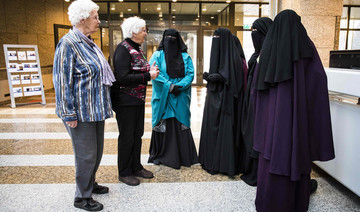THE HAGUE: Dutch authorities have banned a youth congress of Eritrea’s sole political party after protests erupted at the conference center where the meeting would have taken place.
“Public order and security cannot be adequately guaranteed at the moment,” authorities in Veldhoven, in the south of the Netherlands, said in a statement.
Local police said on Twitter they made “dozens of arrests” on Thursday after “incidents” in front of the conference center where the congress would have been held from Friday to Sunday.
The mostly Eritrean demonstrators blocked the center’s entrance after a call to “prevent the conference” was launched by former Eritrean Finance Minister Kubrom Dafla Hosabay on his Facebook page.
The Dutch government had earlier voiced concern over a visit to The Netherlands by an Eritrean presidential adviser to address the conference, saying it found the situation “awkward, since a top Eritrean official will be addressing Eritreans who have left their country.”
Yemane Gebreab, adviser to Eritrean President Isaias Afwerki, had been due to address some 650 members of the People’s Front for Democracy and Justice (PFDJ).
According to the youth movement of the PFDJ, the congress would have been the 13th such event held in Europe, which aims to persuade “young Eritreans to become more active in serving their communities and the interests of Eritrea.”
Eritrean refugees make up the second largest group of refugees taken in by The Netherlands in recent years, after Syrians, and some have voiced fears of being intimidated.
In 2016, the Dutch took in some 2,800 Eritreans, some nine percent of all refugees welcomed into the country, according to the official Dutch asylum-seekers’ organization.
The University of Tilburg said many of the 20,000 Eritreans now living in The Netherlands still feel intimidated.
Eritrean organizations here “report on people who are not loyal to the regime and... make sure that this is known so that measures can be taken,” said Van Reisen.
Back home “people are punished. They do not get food vouchers. They are fined. They are put in prison. So their lives are really made impossible and very miserable.”
Isaias’ regime is accused of jailing thousands of political prisoners since he came to power in 1991 in the Horn of Africa nation, one of the world’s poorest countries.
No general elections have been held since the ex-rebel Marxist leader took power after a three-decade independence war against Ethiopia.
The UN last year estimated some 5,000 Eritreans were risking their lives every month to flee the country, making them one of the largest contingents of people risking dangerous journeys to seek a new life in Europe.
Dutch ban Eritrean youth congress after ‘incidents’
Dutch ban Eritrean youth congress after ‘incidents’












